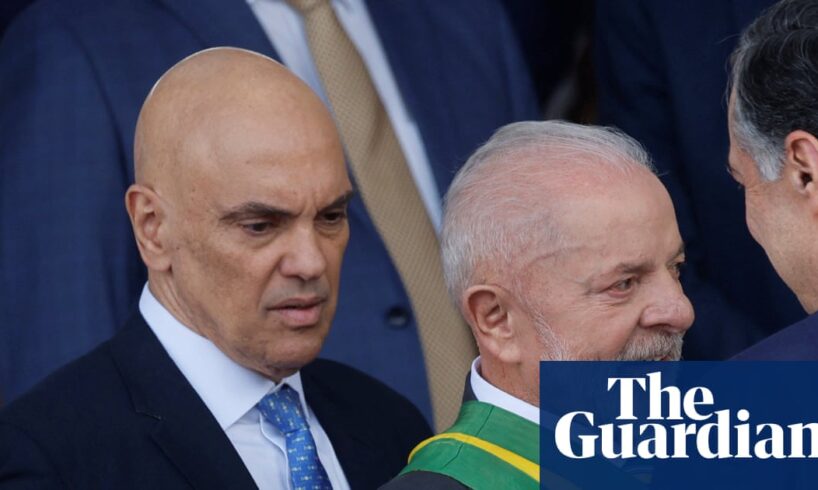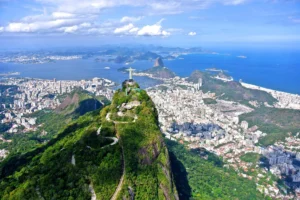
Allies of Brazil’s president, Luiz Inácio Lula da Silva, have accused Donald Trump of launching “a direct attack on Brazilian democracy” after the US treasury slapped sanctions on Alexandre de Moraes, the supreme court judge widely credited with helping save Brazilian democracy from a 2022 rightwing coup.
The highly controversial US move was announced on Wednesday by the secretary of the treasury, Scott Bessent, shortly before Trump followed through on a threat to hit Brazilian imports with 50% tariffs by signing an executive order “to deal with the recent policies, practices, and actions by the government of Brazil”.
Trump has partly attributed those tariffs to his outrage at the supposed political “witch-hunt” against his far-right ally the former Brazilian president Jair Bolsonaro, who is on trial for allegedly seeking to seize power after losing the 2022 presidential election to Lula.
Moraes is presiding over the trial, which is widely expected to result in Bolsonaro being convicted and sentenced to up to 43 years in jail, as well as several other criminal investigations into Bolsonaro and his family.
Announcing the Magnitsky sanctions, Bessent accused Moraes of being “responsible for an oppressive campaign of censorship, arbitrary detentions that violate human rights and politicized prosecutions – including against former president Jair Bolsonaro”.
“Alexandre de Moraes has taken it upon himself to be judge and jury in an unlawful witch-hunt against US and Brazilian citizens and companies,” Bessent claimed.
The US secretary of state, Marco Rubio, tweeted: “Let this be a warning to those who would trample on the fundamental rights of their countrymen – judicial robes cannot protect you.”
A White House statement confirming the 50% tariffs on Brazil – albeit with numerous major exemptions, including oil, orange juice, timber and aircraft – said they were a result of “the government of Brazil’s politically motivated persecution, intimidation, harassment, censorship, and prosecution of former Brazilian president Jair Bolsonaro and thousands of his supporters”.
Hundreds of hardcore Bolsonaro supporters have been put on trial and jailed for taking part in the 8 January 2023 rightwing riots in the capital, Brasília, during which the supreme court, congress and presidential palace were stormed and ransacked.
The sanctions were celebrated by Bolsonaro’s relatives and supporters, who see US pressure as the only way of helping the former president escape a hefty jail term and, perhaps, save his political future. “We Brazilians will never forget this action of yours [Rubio and Trump],” tweeted Bolsonaro’s congressman son, Eduardo Bolsonaro, who has spent recent weeks in the US lobbying the Trump administration to fight for his father’s cause by imposing sanctions.
“Today I have a feeling of mission accomplished but our journey won’t end here,” Eduardo Bolsonaro vowed in a social media video.
But members of Lula’s government denounced the move as a dramatic escalation of what they see as Trump’s crusade to undermine Brazilian democracy.
José Guimarães, a congressperson from Lula’s leftwing Worker’s party (PT), called the sanctions “not just an affront to a supreme court minister … [but also] a direct attack on Brazilian democracy and sovereignty”.
“We will not accept foreign interference in … our justice system,” Guimarães wrote on X, calling the sanctions “the fruit of a Bolsonaro family conspiracy against Brazil”.
Gleisi Hoffmann, a top minister and one of Lula’s closest allies, called Trump’s move a “violent and arrogant act” and expressed the government’s “utter repudiation” of the “absurd” measure.
There was also criticism from conservative politicians. João Amoêdo, one of the founders of the rightwing Partido Novo, called the sanctions “an unacceptable attempt at foreign interference in the Brazilian justice system”.
Eduardo Leite, a conservative presidential hopeful who governs Rio Grande do Sul state, said he could not accept “another country trying to interfere in our institutions”.
Quick GuideContact us about this storyShow
The best public interest journalism relies on first-hand accounts from people in the know.
If you have something to share on this subject you can contact us confidentially using the following methods.
Secure Messaging in the Guardian app
The Guardian app has a tool to send tips about stories. Messages are end to end encrypted and concealed within the routine activity that every Guardian mobile app performs. This prevents an observer from knowing that you are communicating with us at all, let alone what is being said.
If you don’t already have the Guardian app, download it (iOS/Android) and go to the menu. Select ‘Secure Messaging’.
SecureDrop, instant messengers, email, telephone and post
See our guide at theguardian.com/tips for alternative methods and the pros and cons of each.
Illustration: Guardian Design / Rich Cousins
Thank you for your feedback.
The Magnitsky sanctions were named after Sergei Magnitsky, a Russian tax lawyer who died in a Moscow prison in 2009 after being imprisoned for exposing high-level corruption.
They have been used since 2017 to sanction individuals accused of involvement in serious human rights abuses. Past targets have included Saudi Arabian officials involved in the 2018 murder of the journalist Jamal Khashoggi, Nicaraguan officials linked to a deadly crackdown designed to keep its dictator Daniel Ortega in power, Communist party leaders involved in the repression of members of the Uyghur ethnic group in west China and military chiefs in Myanmar involved in alleged acts of ethnic cleansing.
Legal experts and human rights activists voiced astonishment and consternation that such sanctions had been used to target a judge in Latin America’s largest democracy.
Thiago Amparo, an international law and human rights professor from Brazil’s Getúlio Vargas Foundation, said the sanctions exposed “Trump’s distorted view of what a human rights violation is”.
Amparo said Trump appeared to think that one of his ideological allies being given a fair trial for allegedly trying to stage a coup was equivalent to “torture, genocide or other grave violations … to which laws such as Magnitsky are meant to apply”.





